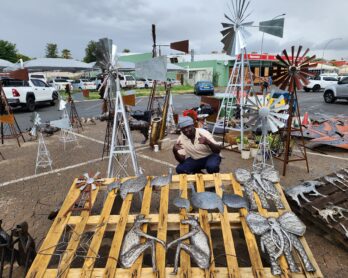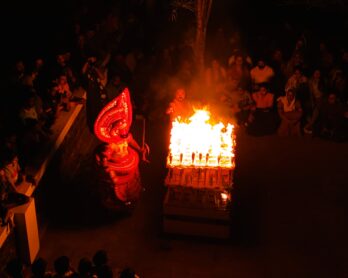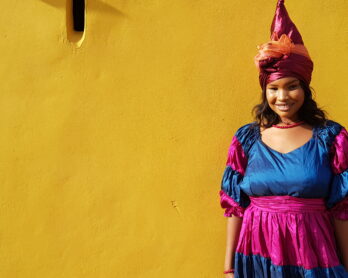Hanging welter covered peeling plaster. The veneer on the butt of an air rifle reflected light, hockey trophies and team memorabilia; a discoloured snood probably worn by Charlie’s wife on their wedding day, frayed ‘Jesus loves you’ pictures curled at the corners; a clock in a chunky wooden case which kept ticking away loudly sometimes even creeping into the catching up underway between the menage and the guests. A smartly attired Charlie from another time smirked from a glassed studio photograph at the gathering through smooth, full lips. My compliment on his dashing looks was met with a gracious nod and a faraway smile. It was a close-knit circle of good-looking blokes, he said absentmindedly. Attracting both attention and envy by the truckload. He turned sharply to look at my mother – the daughter of his best friend – with awe and anger. It must be what, half a century since we saw last? What took you so long to look me up?
Contrary to what Charlie had claimed over the phone no one knew where he lived. But that was because the locals wanted to traduce him and thereby scuttle his chances of being elected to the church council, he said. There was a lot of money to be made as part of the council and apparently his has been the lone voice of morality. Besides, he claimed, his ecumenical stand didn’t hold him in good stead among the heavyweights – the divisive moneybags. Segregation was the new mantra for unity. Power came with pointing out differences. Just come to the church and ask at any of the houses around it for Charlie had been the direction brief. We went along a motorable bund to an island and reached an asbestos shanty where some guys were hunched around a card game. They were the least moved by our sudden appearance and stayed focussed through dilated, unblinking eyes. Marijuana smoke hung in the air. My mother sent me to ask them for Charlie’s whereabouts. They would know, she was sure. He was always one of them.
Charlie’s life had been one of shindigs and shenanigans. My grandfather, who owned several timber mills before he lost all of it to profligacies, had been the chief financier. In return Charlie became the loyal sidekick. Most of the stories from their youth he refrained from sharing. A couple of times I caught him even blushing at their memories. But he would dwell grandly on what they did afterwards – sit on the nearby beach with a full bottle of whiskey and go to sleep on the cold, soft sand. Charlie would sometimes arrange for live band music from the nearby church – the same one whose council he was trying to be on now – and they would dance in the water. The memories pleasantly embarrassed him even now and he would look away. Once or twice he started on the story of a lady who ran a goat farm near my grand dad’s mill and supplied the milk but left it abruptly – a story we all knew well.
The 80-something years of his life Charlie had been living in the future. Tomorrow, he still believed, will be better than what it is today. A stroke had left his wife partially paralysed and took away a big part of memories. She sat in her wheelchair, in a corner, staring at us silently. She would grunt and shriek in between which Charlie would correctly interpret as thirst or inability to follow what was just said. The son, the hockey champion, was an artless simpleton who tried to amuse me with trite lines about his Delhi experiences. I played along by concurring seemingly though it has been my home for over a decade. My initial attempts at contradicting him drew splenetic reactions; even Charlie seemed to sympathise with the son’s distasteful familiarity developed over two weeks of stay in the national capital for an inter-state championship 15 years ago. Upon return he married a local beauty but hung up his boots soon after. His attempts at selling poultry and growing fish met with little success. Both son and father looked forward to a better life by selling a part of the household land. They were on the verge of transacting when demonetisation happened. Now they waited, Charlie said, as if explaining the sorry state of the house, till black money will be back in circulation.
After my grandfather died of a sudden cardiac arrest – my mom who was closest to him was pregnant with me then – Charlie’s fortunes dipped for a while. He pursued a job as a loan collector for a private banking firm. Riding a Rajdoot, the most striking male in town, he soon landed himself another benefactor. This time a playwright from a rich Christian family ostracised from church and society for marrying from beneath his family station. This playwright and his wife were both close friends of my grandfather who supported their decision and stood by them. The writer used to be a regular at their beach parties where he would sometimes recite poetry or put up an impromptu act of his newest play. My mom shared fond memories from her college days where Charlie would send a boat for her and her friends so they could come over to attend when a play premiered. This was during some Christian festival on the island where the church stood. The Vallarpadom Church today is a major pilgrimage centre and is connected by a bridge.
A cat lay on the old oxide floor in our midst lifting an attentive head when conversation ceased. She began rubbing her arched back against our shins when chowder was served. My mother’s eyes sparkled with joy and teared up in equal measure. It was siesta time for my father who was struggling to feign interest. I sat consumed equally by the stories – or whatever was revealed of them – as by the walls which had taken on a surrealistic look representative of a life well-lived and fondly remembered with no regrets.


















oh wooww you just made my day bro. the best thing i read toady is this blog nice work keep it up.
Happy for you, Ben!
I literally found this post very interesting and it just cast spell on me, thanks for sharing this post.